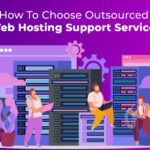As a representative of a more collaborative method of software development, DevOps service underscores the mutual dependence of software development and the operational aspects of a project along with its quality assurance. As you come to know about DevOps, there can be several questions that come to your mind. Does your organization need DevOps? If yes, why? In what all ways will it help improve your business processes? Once you’re convinced to implement it to your business, you’ll want to know what structural changes will you need to make to your organization. What place to assign to the DevOps teams in your organizational structure? And so on. This article is an endeavor to address to all such queries that you might have.
The truth about DevOps is that you do not need it to simply get rid of the poor team collaboration in your business. It is not confined to an industry in particular. And in order to implement agile technology to your software development, it is not necessary to implement DevOps to your business infrastructure. Also, it is true that implementation of DevOps results in improved collaboration between application development and operations teams which is a consequence of removing the challenges of this interaction to make the implementation smooth.
In order to ensure positive returns on the time and money invested in adopting DevOps for your organization, you should make sure of a few key things:
1) Ascertain your expectations out of the DevOps implementation for your organization
More than just a generic solution to the collaboration needs of your development and operation teams, DevOps implementation should serve to identify points in the software development life-cycle where the team collaboration can maximize value creation. This is the very reason why implementation of DevOps needs to be tailored to a particular organization’s needs and it is like ‘not one size can fit all’. For example: DevOps can be applicable in cases of a wide variety of requirements such as availing architectural guidance, interfacing between the applications and infrastructural operations, implementing change management and so on. So, before implementing DevOps to your organization, there should be a clear understanding of the business objectives to be achieved out of it.
2) Clearly demarcate the role and responsibilities of your DevOps teams
The role and responsibilities traditionally assigned across your IT teams need to be reassigned for achieving improved collaborative environment by means of DevOps implementation. The need for DevOps to make decisions involving infrastructure and applications requires you to clearly demarcate the scope of responsibilities of your DevOps teams & align its goals with the project goals to avoid any conflicts amidst high pressure situations of IT operations which can kill the sole purpose of DevOps implementation.
3) List out the skills gap required to achieve DevOps implementation
One of the biggest hurdle in the way of implementing DevOps to any organization is the skills gap or the staff constraints that can come in the way of DevOps adoption. It is therefore required for you to first establish clear understanding of all the skills required to adopting the DevOps model of your interest. This is when you also need to list out all the gaps and constraints in the availability of those skills in your teams. One way is to train the teams to equip them with full-stack capabilities across operations and another is to build teams with members specializing at different and complementary skill-set to work in close coordination.
Having said this, the biggest challenge to be encountered while adopting DevOps is the resistance from the staff to such major process change in the organization. This needs to be managed by working at grass-root level to eliminate this resistance to change. An efficient DevOps team ensures that is doesn’t remain confined to being just one more part of your IT department that faces hindrance from the operations and development teams. As your DevOps Services Implementation partners, we help you ensure building such efficient DevOps teams within your organization. Visit our Portfolio for more information about the services we offer.
Also Read These Latest Posts on DevOps:-
















